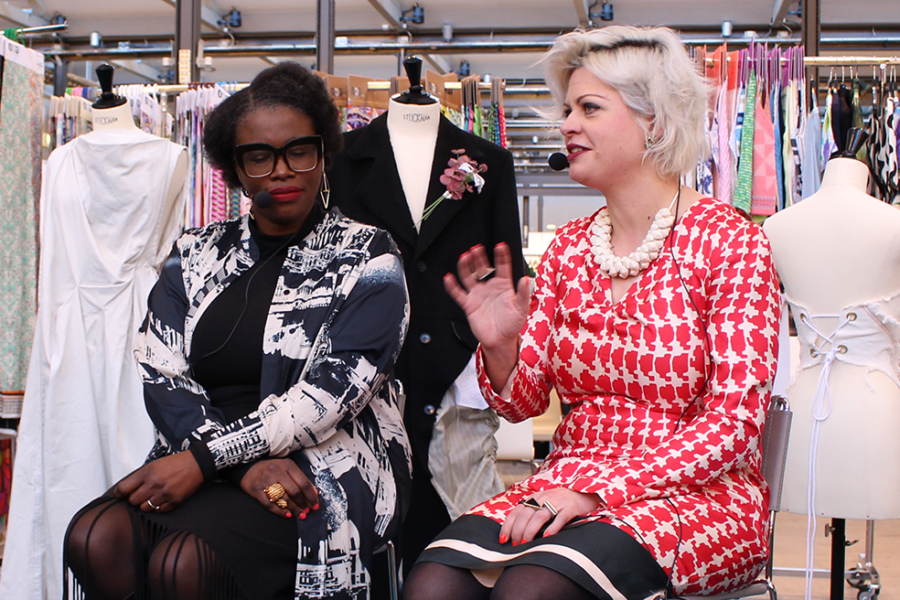
The new EU legislation is coming and it’s coming quicker than you think – but what does it actually mean?
We spoke to Lisa Lang, the Director for EU Affairs & Policy Orchestrator for EIT Climate KIC, about the timeline, the players that will become the most affected – and how it can benefit your business.
EIT CLIMATE KIC is a knowledge and innovation community established and funded by the EIT – European Institute of Innovation and Technology in 2010. We catch Lang in Stockholm Fashion District during Nordic Fabric Fair right after participating in a panel talk on the upcoming EU regulations and what they will mean for businesses. Quite unsurprisingly, it overran the schedule, given how much there is to talk about, explain, and discuss. The question is, how will it affect the creative industries?
– The short answer is: a lot! There will be happening a lot, Lang states. And you can’t get away with it, because it will come through trade, through business, and through accounting. This means that your bookkeeper, at some stage, will have to tell you that you have to start reporting on this and this – since it’s the national legislation.
What’s the timeline here?
– This will all happen from now onwards, until 2026, when it becomes really mandatory. In 2024, the top 50,000 companies in all industries have to start to respond to this non-financial reporting and the plan is that the same will happen to SMEs, the small and medium-sized enterprises, by 2026. The way how, exactly in detail, will be yet to see. We all remember GDPR and the cookies – this will feel very similar to this, just 10 times more. The end game is that if you don’t comply, you’re not allowed to trade, full stop. No compliance – no business. Comply or die.
– The reason why it happens so quickly – and what’s really important to understand – is that the European government has decided that Europe has to become ’the green champion in the world’ in order to stay competitive. And also that sustainability shall not become a burden but a competitive advantage. The thing with the European Commission is that everything is transparent. They are not that much on Instagram but very active on Twitter, and YouTube. It’s European taxpayers’ money and Sweden, like every European country, has members of the European Parliament who are there to support your interest. Go and talk to them! Sweden is small, you all know each other!
How will this be controlled? And by who?
– What the EU does is that they give a directive. A directive is not like laws set in stone, it just says to the national governments that this is a result that you have to deliver.
And will it affect the entire fashion industry? Producers, factories, retailers, brands, and designers?
– Of course. Everything! Absolutely!
In different ways, or similar?
– The biggest burden will be on the producers and the manufacturers. The brands will go to the factories and say: ’OK, we have to write this compliance report, so you have to give us all of the information – you make it, we are just ordering it from you and sell it’. But compliance is very much the transparency of the making, so manufacturers – as always – will get hit the hardest. But that also means that the producers and manufacturers, actually now have the biggest power.
They’ve always had, haven’t they?
– They’ve always had but nobody let them. I lived in the north of Portugal for years and I’ve been telling them all the time, that ’OK, just understand that you as the makers, this is the rise of the makers’. The ones who can make and produce have the knowledge. That means that they also have the ability to change.
Do they understand it themselves when you speak to them, the coming increased power in the industry? Will they take advantage of it?
– They do. They don’t have any other choice, because of the amount of pressure that they have to go on. There is a power shift. You can see the EU legislation and directive as a friend or as a threat – it’s up to you how you want to create the narrative. I highly recommend seeing it as a friend – life will be so much nicer. It will still be difficult because we need to save the planet, but it will be easier to handle.
And for those you consider who will be the most affected, will they have to hire certain experts or can they handle it themselves with all the administration?
– If you want to become a Compliance Officer for textiles, where is the university degree for that?
But perhaps lawyers?
– Yes, but in an ideal solution, in the beginning, you have to self-educate. Of course, if you’re able to have your own compliant office, then please do. If you can’t, then consolidate. In a lot of fragmented industries, we just come together as a cluster and we put our funds together so that somebody can represent us. So, you can either do that or just join an association. The European Fashion Alliance started just last year and I have high hopes for it. How do you bring industry companies together who haven’t learned how to work together? You now get forced to. The fashion industry had like 50 years to, out of their free will, have a functional European fashion council. You had your choice. Now, you will be forced to.
Are certain markets more prepared for what is to come?
– First: other industries are far better prepared. I think that the fashion industry is one of the least prepared of them all. In terms of nations, for instance, France is really ahead because they do self-compliance. They just decided on their own that they’re not gonna wait until the European directive becomes mandatory but will have their own, mandatory, eco-labelling system. Germany tried to do that with The Green Dot a few years ago but it wasn’t mandatory and of course, nobody adopted it. Germany, however, has an advantage that they’re prototyping the Digital Product Passport, which will be a part of the whole traceability trackability. Estonia is a digital nation and will have it super easy. Or easier, there’s nothing like easy here. I’m really worried for Italy, especially their textile industry, Lang shares. She adds:
– Sweden is an affluent country. So, worst case, just throw money at it!
For the Digital Product Passports, Lang recommends the creative industries to look at the industries that are the closest neighbours.
– European technical textile manufacturers are far ahead. They have the knowledge already, because they produce textiles for protective gear, for aviation, and such, so, they’re very used to dealing with legislation. From a cultural perspective, what I’m mostly concerned about in the fashion industry is the culture, the social culture, and the inability of working together. Seriously, the fashion industry is so, so, so behind. And as harsh as it sounds – if you just look at the data, the industry would highly likely get annihilated by legislation. We don’t have time to rebuild something new, we can only reconnect. The worst thing that you can do is to do nothing.
So, what would be a good first step to do?
– To google the EU Textile Strategy. It’s kind of a crystal ball to what will happen in the next years.
How’d you explain the Digital Product Passports?
– It will be a tool which will be mandatory to apply to the non-financial reporting process. The idea is that you can track and trace a product and that every item you have comes with a passport. You then know the provenance and then you can also digitally prove it: ’This button came from this and travelled to this and was in this garment and then it was brought in the factory and then got shipped there.’ In order to do this, you can’t do it with paper and pen but you need technology. And for a supply chain that is not digitised, it will be really difficult to implement a digital tool into a non-digitised supply chain. That is going to be the issue of the industry – and the government is not going to help you because you didn’t do your homework and went digital.
Do you have any recommendations about having to handle these passports?
– Again, go to your neighbours. Consumer electronics and other industries already have that implemented.
With the EU aiming to become the mentioned ’green champion of the world’, Lang also states that it’ll mean a competitive advantage – and great business opportunity.
– This is what France made really bright when proactively putting in a system. The reason why they’re pushing their industries now to go mandatory before it’s mandatory on a European level means that they’re under bigger pressure to be more ahead of the game. It’s brilliant! Consumers are looking for more sustainable products. Especially in Sweden. You’re sustainability hipsters! Take advantage of that, there’s a demand for it. In an ideal solution, if you want to increase your profit margin for an item, you would of course sit down with your politicians and say that we need to be subsidised. If something is sustainable, like truly sustainable, it should be less expensive than the non-sustainable product. And that is something you can do in your government with the industry. You don’t even have to wait for laws, you can just self-comply. Just make an agreement, and do a test run. Everything starts with what you start talking about with each other.
Will we see more expensive garments with the new legislation, due to the bigger administration?
– I would say the other way around; affordable.
Why?
– Because we need more of the affordable stuff. Not necessarily cheaper, because that’s two different things. If you invest your money in a good jacket and then, you need to repair it – the expense of repairing an item should be deductible. Over time, you make your money back, because you invest it into a really good local item. The fact that you buy stuff from a local manufacturer should be celebrated and the mindset should be to make it affordable. Not cheap. Cheap has never been a solution! That’s why we’re in all of this shit – because we made everything cheap. Cheap is disrespectful, affordability is respectful. But that means that the system, how we’re doing trade and business now also has to be changed, Lang concludes.
Photo above: Lisa Lang (to the right) together with Muchaneta ten Napel during their panel discussion about the new EU regulations at Nordic Fabric Fair this January.




